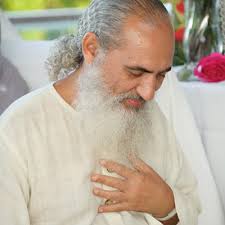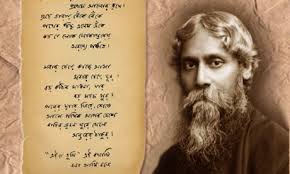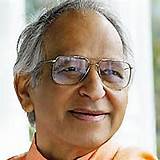‘The yogi casts his human longings into a monotheistic bonfire consecrated to the unparalleled God. This is indeed the true yogic fire ceremony, in which all past and present desires are fuel consumed by love divine. The Ultimate Flame receives the sacrifice of all human madness, and man is pure of dross. His metaphorical bones stripped of all desirous flesh, his karmic skeleton bleached by the antiseptic sun of wisdom, inoffensive before man and maker, he is clean at last.’ – Paramahansa Yogananda
A few days ago, I meditated with Swami Veda Bharati of the Himalayan Tradition. After the meditation, he gave a small satsang in which he said that somebody had asked him how to attain siddhis (yogic psychic powers). Swamiji’s response was that he wasn’t interested in siddhis: the only thing he is interested in is purification. His Master, Swami Rama, had once asked him what yogic siddhis he wanted. None, he replied, the only thing worth attaining was Samadhi. Now you have to consider that if anybody possessed yogic siddhis in this world, it was Swami Rama, and such an offer coming from him would be very tempting indeed to many aspirants. Nonetheless, Swami Veda knew that siddhis are a mere distraction on the spiritual path, and that to really grow spiritually we have to purify our minds and emotions. Only when we are free from our pasts and are able to keep our hearts open with pure love at all times have we attained anything.
Then what actually is this spiritual purification, and why is it so important? Purification is a strange word at first and may even trigger reactions in some. It sounds as though we are somehow impure or even sinful, right? I therefore think that first we need to clarify what the concepts of pure and impure really mean in this context. In my understanding, purity is divine love – a selfless, unconditional love that is not bound by expectations of any kind, and related values such as compassion and kindness. This is our true, ‘pure’ nature. On the flip side, impure are all of the emotions and actions that come from a different place: selfish ‘love’ that is motivated by attachment and need; dishonesty, and anything that is obscured by the veil of maya which tries to tell us that we are not loved and that we therefore have to manipulate others to receive that love, or punish them for not giving it to us.
All of this ‘impurity’ can be traced back to our pasts. There generally comes a moment in our early lives when we lose our trust because we don’t get what we need. As my Master Sri Prem Baba says, that is the moment during which we learn how to hate. We stop trusting that our needs will always be met; we learn how to be jealous, competitive, manipulative, insecure and so on – all with the motivation of receiving the love we need as children. Veils of separation start covering our Being, and this is how our conditioning grows and thickens.
In addition, our emotional bodies carry the impressions and wounds of past lifetimes, something we call samskaras in the yogic world. They consist of everything that has ever happened to us, in particular traumatic events. All these impressions and karmas are what we are not, yet they are very powerful because they are what drives us on an unconscious level. And it is exactly these mental and emotional ‘impurities’ or however you want to call them, that stand between us and the ultimate Truth, that means the realization of who we truly are – because they are an illusion.
The interesting thing is that we are often not even aware of the storehouse of pain we carry around with us – until we get involved in a romantic relationship with somebody. Intimacy with another person can be the best mirror for where we are at spiritually. We can often live in the illusion that we are blissfully happy and have healed our past, and then somebody comes along and we realize just how much stuff we have merely suppressed because nobody has had the opportunity to trigger it. And unless these issues are cleared completely from our systems, we cannot be free.
OK, then how do we purify our emotions? If we’re on the spiritual path, it tends to happen automatically. Life will bring us what we need – the trick is to actually recognize it as such, get out of our victim mentality and not blame the other person for our discomfort. When we can stay present and take responsibility for everything that happens to us, purification will be a given. This process accelerates incredibly once you have found your spiritual Master, because his or her interest is to bring you to the goal of realization in the quickest possible way. Once you give your Master permission to work on you by taking initiation with him or her and you sincerely practice the methods s/he prescribes you, a lot tends to happen.
People often think they find their Guru and things are going to be bliss from that moment onward. We will fly towards Samadhi on wings of ecstatic joy. I smile as I write this because when I first met my Guru, I was one of these people. He was so beautiful and so full of light that I instantly surrendered at his feet, and the first months of our ‘spiritual courtship’ were just like when you fall in love with somebody – filled with bliss, joy, ecstatic love and connection. And then…. when I was deeply in love and committed to him, he took out his knife and started his work in earnest. And it became hell at times, because what Guru’s energy does is to bring our stuff to the surface rapidly. The love and devotion we feel for our Master is actually only a tool that keeps us committed to doing the work even when it becomes absolute torture – not dissimilar to a romantic relationship where we go through all sorts of uncomfortable things because we love the other person.
But the difference is that in the Guru-disciple relationship, there is no expectation from the side of the Guru. All s/he cares about is that you do your work and reach the goal of liberation as soon as possible. The relationship therefore isn’t messy because both Guru and disciple are (ideally) very clear what they’re in this game for. So when s/he metaphorically ‘beats you up’, you smile and bow with gratitude because you know one more karma is dissolving. (I know this statement may sound uncomfortable to many because some Gurus have abused their status and power, so be discerning about who you choose as your Master. You will soon know in your heart whether he or she is authentic and whether the work is truly liberating you.)
Guru is an annihilating fire that burns everything away, most of all your identity. All you have been holding on to for so long, the things that have ‘made’ you into who you are, or believe you are, including your attachment to your nationality, your society, your beliefs, even your personality dissolve in the transformational fire of the Divine. I’ve recently been going through a process in which everything I believed defined me started to melt away. Not just the undesirable things, like old patterns, but also all the things I loved and with which I had identified myself for so long. Even things like rituals I had practised for many years started to lose their meaning because there was the realization that everything is inside of me and that I didn’t need these outer expressions any longer. But it was unsettling also: suddenly, there seemed to be nothing to hold on to any longer. Without all of these things, who was I? And what is the personality, in fact? A collection of samskaras, nothing more and nothing less. Underneath these samskaras and veils, we are nothing but pure energy and we are all the same.
Let’s not kid ourselves, emotional purification is tough. It’s arguably the toughest thing you can ever do, because this letting go and expansion of consciousness can be incredibly painful. So many old, repressed emotions that we have carried around for lifetimes are stuck in our systems, and this defrosting brings them all to the surface for us to look at and let go. It’s not comfortable and it can be utterly humiliating when we see how many people we have hurt or how many dramas we have created under the spell of illusion. And often, many other symptoms, physical, mental and emotional, such as insomnia, energy shifts, increased sensitivity, fatigue etc. appear at the same time.
But if we want to be free, truly free, then there is no other way. Because our samskaras are exactly what stand between us and enlightenment. And with every one of these emotional sheddings, we feel lighter. We see things with more clarity, and patterns and insecurities that have blocked us for years suddenly transform and fall away. And without these toxic emotions and distortions of reality, we remember who we truly are and we see things as they actually are. We regain our trust and become spontaneous again. This is grace, and it makes it all worth it.
The following poem from Rabindranath Tagore’s ‘Gitanjali’ has become my prayer in recent months and gives me strength when it gets too much sometimes. It reminds me of why I am doing this work and that I am willing to do what it takes.
‘Give me more pain, more pain
Give me more consciousness
Tear open all doors, smash down all walls
Give me more pain, more pain
Give me more consciousness
Tear open all doors, smash down all walls
Give me more release, more release
More love, more love,
That the ‘I’ in me may drown,
More love, more love,
That the ‘I’ in me may drown,
Give me more, more, more streams
Of nectar to drink
Give me more, more, more’
.
Here’s a great website with advice on spiritual awakening: http://www.spiritualawakeningprocess.com/
My Master Sri Prem Baba’s website: www.sriprembaba.org
My book ‘Meeting Shiva – Falling and Rising in Love in the Himalayas’ is out now on Changemakers Books and BPI India





